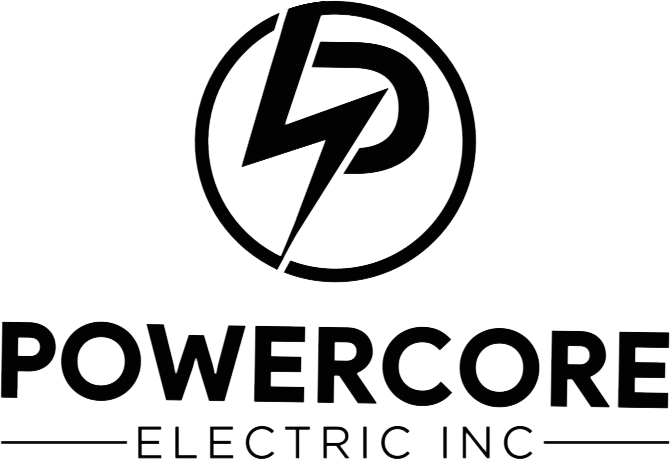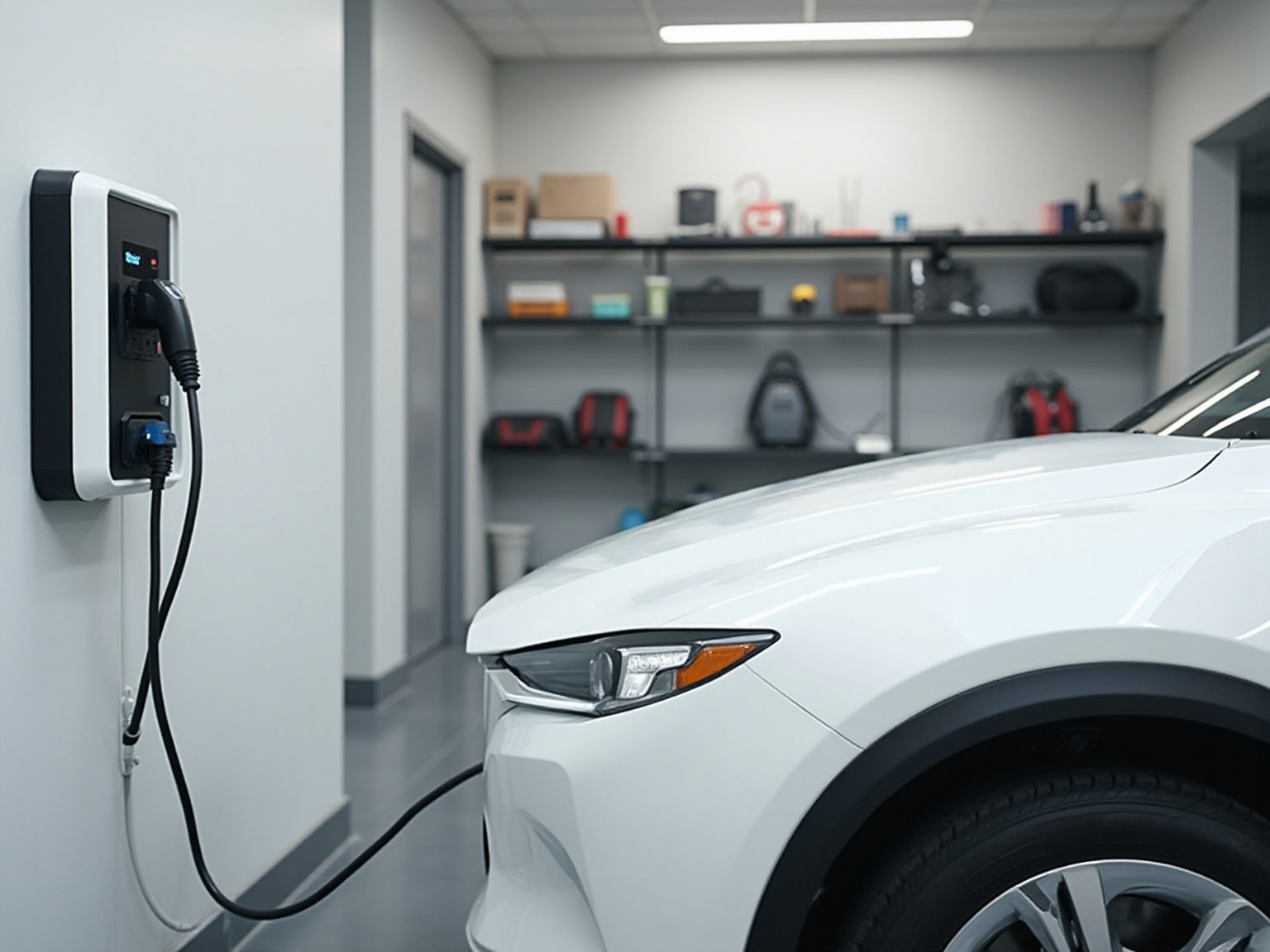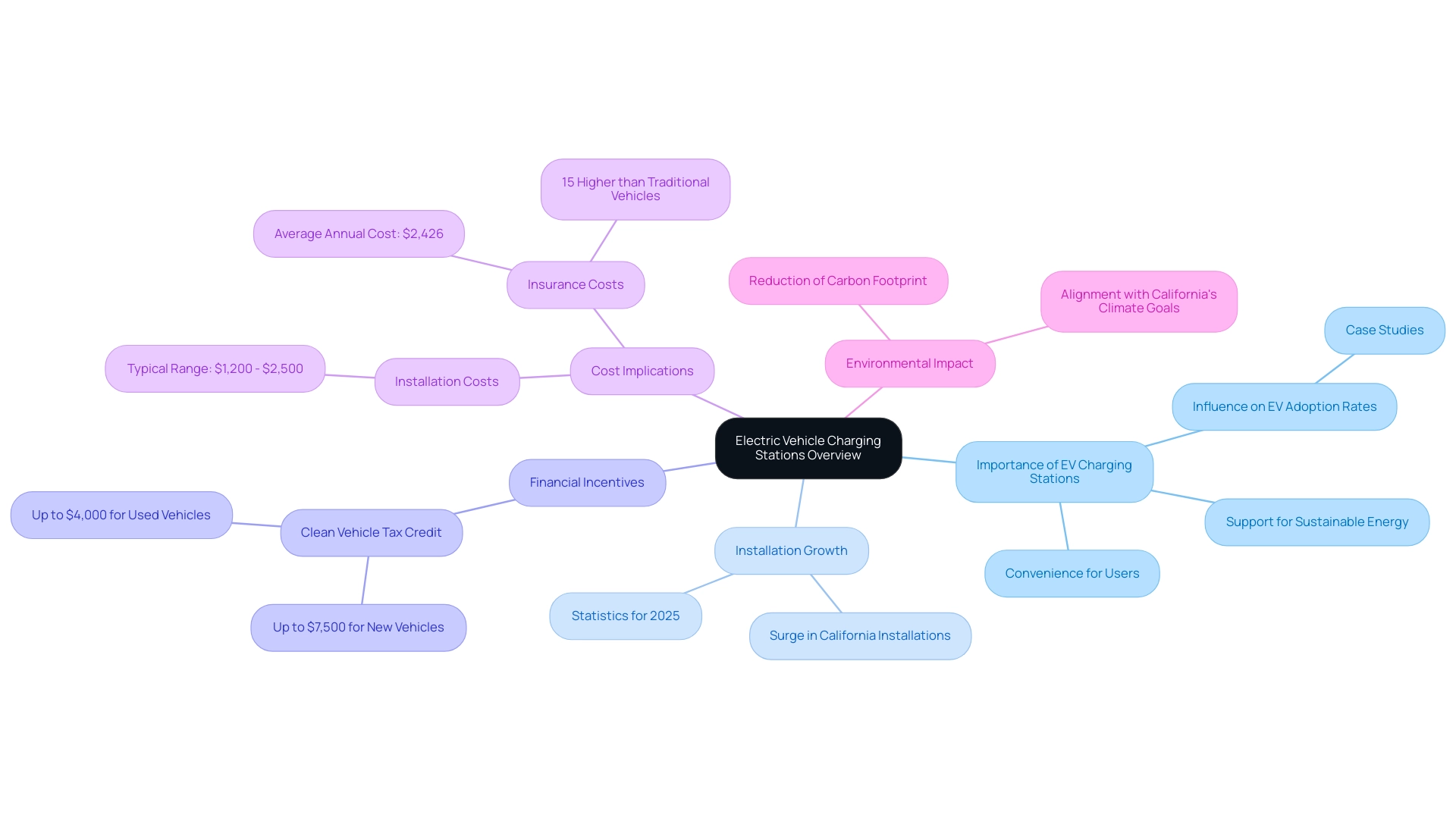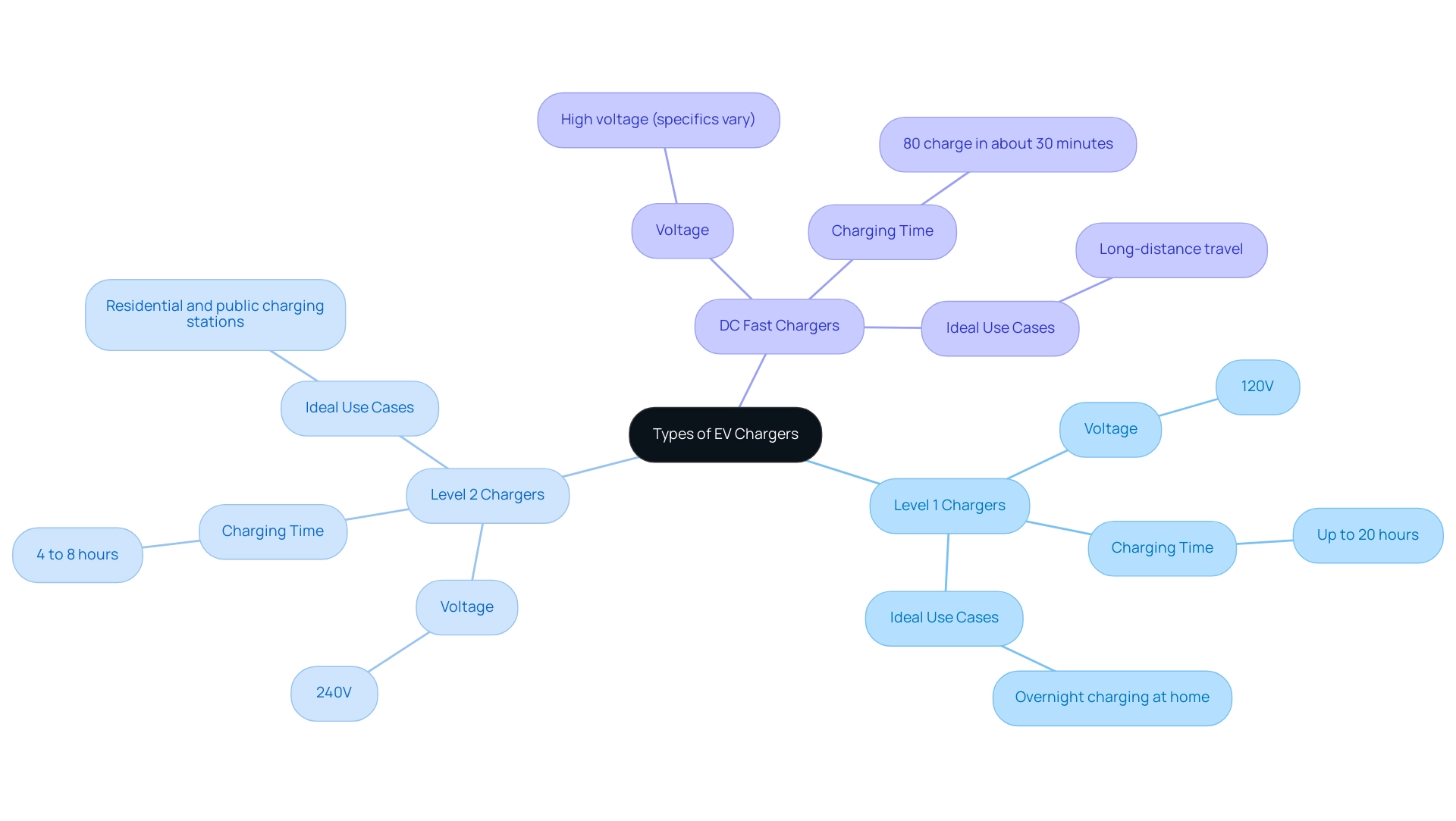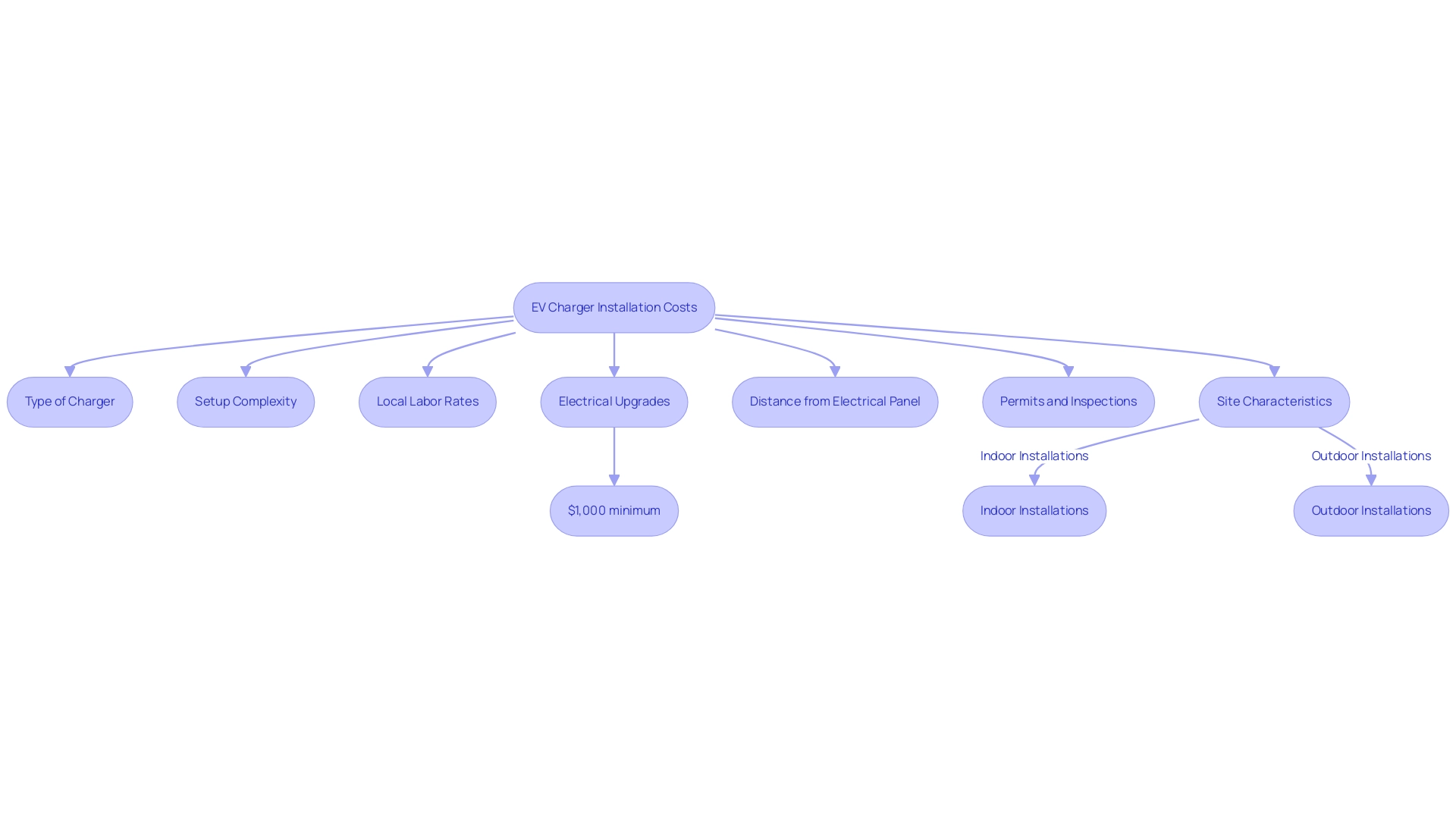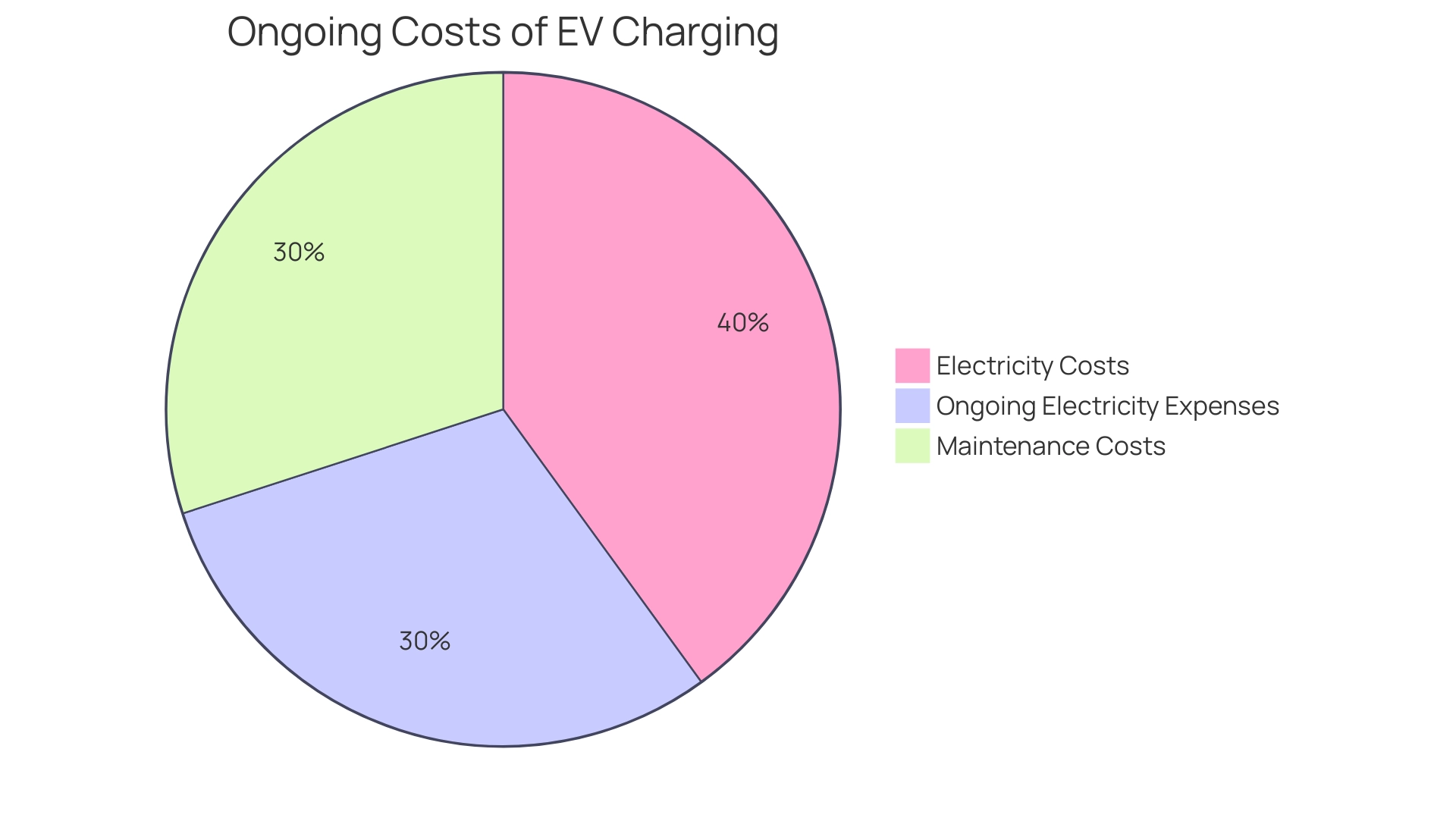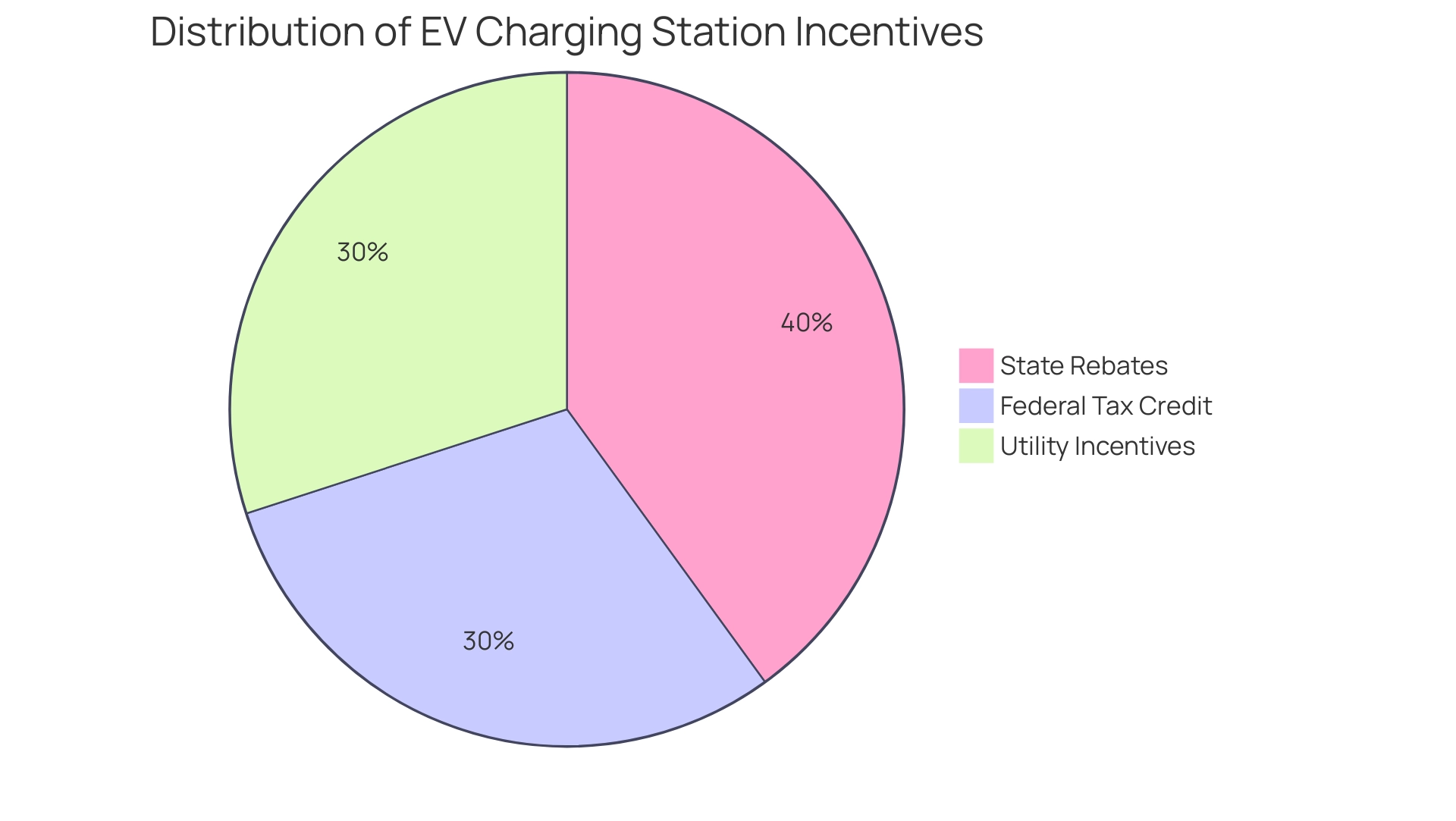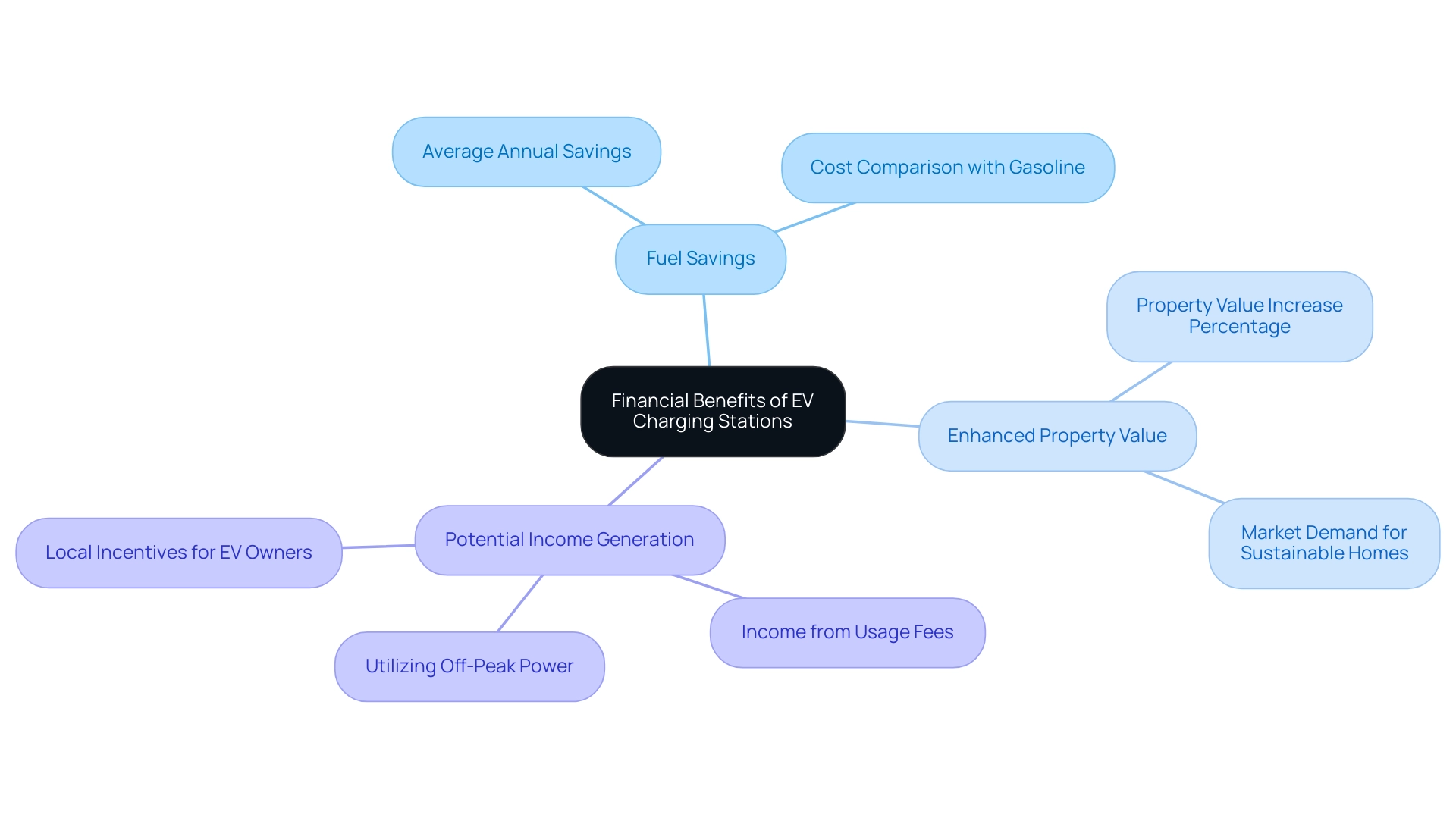Overview
We understand that the cost of an EV charging station can be a concern for many homeowners, typically ranging from $1,200 to $2,500. This variation is influenced by factors such as installation complexity and necessary electrical upgrades.
It’s common to feel uncertain about these expenses, but rest assured, there are financial incentives available that can significantly offset these costs. This overview is supported by a detailed analysis of installation costs, highlighting how transitioning to electric vehicle infrastructure can lead to not only energy independence but also long-term savings.
Together, we can explore these options and find the best solutions for your needs.
Introduction
As we collectively move towards cleaner energy solutions, electric vehicle (EV) charging stations have become an essential part of supporting the increasing number of electric vehicles on our roads. We understand that the convenience of owning an EV can be a source of concern, but these stations not only enhance that convenience; they also significantly promote sustainable practices that benefit us all.
With a notable surge in installations, especially in California, it’s important for potential EV owners to grasp the various types of chargers available, the installation costs involved, ongoing expenses, and the incentives that can ease this transition. This comprehensive exploration aims to guide you through the infrastructure that supports electric vehicles, offering insights into how you, as a homeowner, can navigate the shift to electric mobility while maximizing both your financial and environmental benefits.
Together, we can embrace this journey towards a more sustainable future.
Understanding Electric Vehicle Charging Stations: An Overview
Electric Vehicle (EV) refueling points are essential to the framework that supports electric vehicle ownership, enabling users to recharge their vehicles effortlessly at home, work, or in public spaces. As the demand for electric vehicles continues to rise, understanding the role of these power points becomes increasingly important for prospective EV owners. They not only enhance the convenience of owning an electric vehicle but also contribute significantly to advancing sustainable energy practices.
In California, the installation of EV power points has surged, reflecting a growing commitment to clean energy solutions. Recent statistics indicate that the number of residential EV power sources has increased substantially, with thousands of new setups recorded in 2025 alone. This trend is further supported by federal incentives, such as the clean vehicle tax credit, which can provide up to $7,500 for new electric vehicle purchases, making the transition to electric vehicles more financially accessible.
At Powercore Electric, we take pride in our local expertise and unmatched quality craftsmanship. Our team is dedicated to providing reliable and comprehensive assistance for your home’s electrical needs, including the installation of EV power sources. We understand the unique electrical and solar needs of Northern and Southern California communities, ensuring that our solutions are tailored to meet your specific requirements.
Your satisfaction is our priority, and our customer-first approach guarantees a seamless and stress-free experience.
The importance of electric vehicle power sources extends beyond mere convenience; they are crucial in reducing carbon footprints. By encouraging the use of electric vehicles, these locations help decrease greenhouse gas emissions, aligning with California’s ambitious climate goals. Industry experts highlight that a robust EV refueling infrastructure is vital for promoting clean energy adoption and achieving sustainability targets.
As David Hochschild, Chair of the California Energy Commission, notes, “The growth of EV refueling points is essential for facilitating the shift to a cleaner, more sustainable transportation system.”
Case studies have shown that the availability of EV refueling stations significantly influences electric vehicle adoption rates. For example, neighborhoods with easily accessible power sources report higher rates of EV ownership, illustrating that convenience directly impacts consumer behavior. Additionally, the average annual insurance cost for electric vehicles is approximately $2,426, which is about 15% higher than for traditional vehicles, underscoring the need for thorough planning when considering the total cost of EV ownership.
To provide clarity on costs, it’s essential to understand how much an EV charging station costs. Our installation services for EV power stations typically range from $1,200 to $2,500, depending on the complexity of the installation and specific requirements.
Looking ahead, the California Energy Commission held a public workshop on May 29, 2024, regarding summer reliability outlook, with upcoming workshops on energy data analysis and clean energy topics planned for February 2025. These discussions will be pivotal in shaping policies and practices that promote the development of sustainable energy solutions, ensuring that homeowners can confidently invest in electric vehicles and the necessary infrastructure.
Trust Powercore Electric to guide you toward sustainable energy solutions that benefit both your home and the planet. For more information or to receive your free, personalized estimate, please reach out to us at ryan.serrano@powercoreinc.net or call (916) 699-8778. Don’t just take our word for it; hear from our satisfied customers: “Powercore Electric made the installation process so easy and stress-free!”
- Jane D., satisfied customer.
Types of EV Chargers: Level 1, Level 2, and DC Fast Charging
Electric vehicle (EV) chargers come in three main types: Level 1, Level 2, and DC Fast Charging, each designed to meet various power needs and situations.
- Level 1 Chargers: Using a standard 120-volt outlet, Level 1 chargers represent the most basic option available. Typically requiring up to 20 hours for a full charge, they are best suited for overnight recharging at home. This option is perfect for those who drive shorter distances daily and can conveniently plug in their vehicle overnight.
- Level 2 Chargers: Operating on a 240-volt outlet, Level 2 chargers significantly reduce charging time, allowing for a complete charge in approximately 4 to 8 hours. Frequently found in residential settings and public charging stations, they are a favored choice for homeowners looking to power their vehicles more efficiently.
- DC Fast Chargers: As the fastest charging solution, DC Fast Chargers can deliver an 80% charge in about 30 minutes. Primarily located at commercial sites, these chargers are especially beneficial for long-distance travel, enabling drivers to quickly recharge their vehicles during road trips.
Understanding the differences between these charger types is essential for potential EV owners. It allows you to choose the most suitable option based on your driving habits and lifestyle. For instance, as we look towards 2025, statistics show that 80% of EV charging occurs at home, highlighting the importance of having a reliable home charging solution.
At Powercore Electric, we are here to support you with extensive setup services for all types of EV chargers, ensuring a seamless integration into your home. Our setup process includes a thorough site assessment to evaluate your home’s electrical capacity, necessary upgrades to support the charger, professional installation, and comprehensive testing to ensure optimal performance. This holistic approach guarantees that your charging station operates safely and efficiently.
When considering the cost of an EV charging station, it’s important to factor in setup expenses, as these can vary based on the complexity of the electrical improvements needed. Additionally, California homeowners can benefit from the SCE Charge Ready rebate of up to $4,200 for electrical panel upgrades, significantly reducing installation costs.
As David Hochschild, Chair of the California Energy Commission, expressed, ‘Come be part of creating a clean, modern and thriving California,’ emphasizing the importance of embracing sustainable energy solutions like electric vehicle infrastructure. Furthermore, with 39% of Americans living within a mile of a public EV charging station, urban residents enjoy greater access to charging options, making the transition to electric vehicles more feasible.
For more information on our services, including solar panels and battery backups, or to schedule a consultation, please reach out to Powercore Electric at (916) 699-8778 or email us at ryan.serrano@powercoreinc.net. Together, we can work towards a sustainable future.
Installation Costs: What to Expect When Setting Up Your EV Charger
The expenses associated with EV chargers can fluctuate considerably, raising questions about how much an EV charging station costs. This can depend on various elements such as the type of charger, complexity of setup, and local labor rates. As eco-conscious homeowners in California look ahead to 2025, they might wonder about the costs involved, as the average price for a Level 2 charger setup is expected to range from $800 to $2,500. This range reflects the diverse needs and situations of different households.
Key factors influencing these expenses include:
- Electrical Upgrades: If your home’s electrical system requires enhancements to accommodate a Level 2 charger, you should expect to add at least $1,000 to your total expenditures. Enhancing your electrical panel or wiring might be essential to guarantee safe and efficient functioning.
- Distance from Electrical Panel: The expense rises with the distance between the charger and the electrical panel. Greater distances necessitate extra wiring and labor, which can significantly influence the total price.
- Permits and Inspections: Local regulations may mandate permits for setup, increasing the overall expense. It’s essential to factor in these potential expenses when budgeting for how much an EV charging station costs. To ensure you receive a fair price, it’s advisable to obtain multiple quotes from licensed electricians. This method not only assists you in comparing expenses but also enables you to assess the skill and dependability of various service providers.
Additionally, the particular characteristics of your site can influence the cost of an EV charging station. For instance, indoor installations tend to be less expensive than outdoor ones, which often require weather-resistant features and customized cable lengths. Understanding this distinction is essential for homeowners when organizing their installations.
Recent case studies highlight the financial incentives available for homeowners transitioning to electric vehicle refueling solutions. For instance, the federal government provides a 30% tax credit for photovoltaic solar panel systems, which can enhance your EV power setup by improving your home’s energy efficiency. Such incentives not only lower initial expenses but also support California’s broader commitment to renewable energy.
Furthermore, Qmerit, recognized as North America’s largest network of certified EV charger installers, has established over 450,000 EV charging stations throughout the U.S. and Canada, showcasing the expanding infrastructure and support for EV charging solutions. Powercore Electric Inc. is proud to be part of this network, offering expert setup services for EV chargers, solar panels, and battery backups to assist homeowners in maximizing their energy efficiency.
As the demand for EV chargers continues to grow, it is crucial for homeowners to understand the costs involved and other factors when investing in sustainable energy solutions. For personalized assistance, please contact Powercore Electric Inc. at (916) 699-8778 or email ryan.serrano@powercoreinc.net to discuss your EV charger installation needs and receive a quote. Additionally, California is developing a robust legal framework to support EV infrastructure measures, which further enhances the viability of investing in these technologies.
Ongoing Costs of EV Charging: Electricity and Maintenance Considerations
When planning your budget for your electric vehicle, we understand that considering the cost of an EV charging station is essential. Having an EV charger involves several ongoing expenses that can affect your overall financial comfort. Let’s explore these together.
- Electricity Costs: In 2025, charging an electric vehicle at home in California typically ranges from $0.10 to $0.20 per kWh. For instance, filling a Nissan LEAF with a 54 kWh battery from empty might require about $6 to completely power. Moreover, powering a Nissan LEAF with DC fast power delivery amounts to approximately $16 for a complete charge, offering a pertinent comparison to domestic power expenses. Keep in mind, this expense can fluctuate depending on local electricity rates and the effectiveness of your setup for powering.
- Ongoing Electricity Expenses: It’s common to feel overwhelmed by fluctuating energy costs. With the deregulation of electricity markets in several states, including California, homeowners now have the flexibility to choose their electricity provider. This competitive landscape may lead to lower rates, making home charging more economical and easing your financial concerns.
- Maintenance Costs: Although EV chargers are designed to be low-maintenance, it is prudent to allocate a budget for periodic inspections and potential repairs. On average, maintenance expenses for EV chargers can vary from $100 to $400 annually, depending on the type of charger and frequency of use. For example, Level 2 chargers may require more frequent checks compared to standard home chargers due to their higher usage rates. Powercore Electric’s internal team of specialists assures top-notch setups and maintenance, ensuring that your EV charger remains in optimal condition.
- Case Studies on Ongoing Expenses: Property owners who set up commercial electric vehicle power sources frequently gain from rebates, which can reduce setup expenses and increase the overall worth of their property. These incentives not only attract more traffic to businesses but also improve tenant or employee satisfaction, showcasing the financial viability of investing in EV infrastructure.
Understanding how much an EV charging station costs, along with these ongoing expenses, is essential for evaluating the total expenditure of ownership for your electric vehicle and charger. By factoring in electricity and maintenance expenses, you can make informed decisions that align with your budget and sustainability goals. As Voelcker wisely advises, “Always ask before plugging in!” Together, we can navigate these considerations and work towards a more sustainable future.
Incentives and Rebates: Reducing Your EV Charging Station Costs
Many states and local governments are actively encouraging the establishment of EV charging stations by offering a range of incentives and rebates. We understand that concerns about the costs associated with setting up an EV charging station can be daunting, but these incentives can significantly alleviate the initial investment needed. Here are some key incentives to consider:
- Federal Tax Credit: Homeowners can enjoy a tax credit that covers 30% of the setup costs, with a maximum credit of $1,000. This federal support is designed to foster the adoption of electric vehicles and the necessary infrastructure.
- State Rebates: In California, state-specific rebates can range from $250 to $5,000, depending on the program and setup specifics. We encourage homeowners to consult their local utility companies to discover the exact offerings available in their area.
- Utility Incentives: Numerous utility providers offer additional discounts or rebates for EV charger installations, especially for those who charge their vehicles during off-peak hours. This not only helps in reducing costs but also promotes energy efficiency.
As we look ahead to 2025, the landscape of incentives continues to evolve, with many states enhancing their programs to support clean energy initiatives. For instance, California has introduced various state-specific rebates aimed at making EV refueling more accessible and affordable for homeowners. Additionally, the federal EV tax credit requirements have been updated, ensuring that consumers are well-informed about the criteria necessary to qualify for these financial benefits. To stay informed about current incentives, homeowners can visit the U.S. Department of Energy Alternative Fuels Data Center. Many homeowners who have taken advantage of these incentives report significant savings, making the transition to electric vehicles more feasible. For example, a recent case study highlighted how a homeowner in California saved over $3,000 on their EV installation through state and federal rebates, showcasing the tangible benefits of these programs and aligning with the federal EV tax credit requirements.
As the push for sustainable energy solutions grows, understanding the available incentives and rebates for EV installations is crucial. Consulting with a tax professional can provide clarity on how to maximize these benefits, ensuring that homeowners can make informed decisions that align with their financial and environmental goals. As Steven Ewing, Director of Editorial Content at Edmunds, emphasizes, understanding these incentives is vital for homeowners looking to invest in EV refueling solutions. Together, we can navigate these opportunities and work towards a more sustainable future.
Financial Benefits of EV Charging Stations: Savings and Value Additions
Investing in an EV fueling station can bring numerous financial advantages that significantly impact homeowners in California, particularly those partnering with Powercore Electric.
-
Fuel Savings: We understand that managing energy bills can be a concern. Charging an electric vehicle (EV) at home is typically more economical than refueling a gasoline vehicle. With California’s electricity rates, homeowners can save hundreds of dollars annually on fuel costs. For instance, studies indicate that the average yearly fuel savings from powering EVs at home can reach up to $1,000, depending on driving habits and local electricity prices. This statistic highlights the potential for substantial savings, especially for eco-conscious homeowners.
-
Enhanced Property Value: It’s common to feel that your home is an investment. Homes fitted with EV power sources often see a significant rise in property value. Research indicates that properties with electric vehicle support appreciate faster than those without, with some studies suggesting an increase of up to 4% in home value. This trend is particularly pronounced in California, where eco-conscious buyers are increasingly seeking homes with sustainable energy solutions. The availability of an EV power source can enhance a property’s appeal in a competitive market.
-
Potential Income Generation: For those contemplating commercial setups, an EV power supply can act as a means of extra revenue. By imposing fees for usage, property owners can generate a new income stream while promoting sustainable practices. This is particularly significant in regions with high pedestrian activity, where the need for power sources is increasing. Furthermore, utilizing off-peak power at home and taking advantage of local incentives can further increase the financial advantages of owning an EV supply point.
At Powercore Electric, we utilize our local knowledge to ensure a smooth setup of EV support points customized to your requirements. Our commitment to sustainable energy solutions means that we not only help you save money but also contribute to a greener planet.
- Customer Testimonials: “Powercore Electric made the setup of my EV power source effortless! Their team was professional, knowledgeable, and I love knowing I’m contributing to a sustainable future while saving on fuel costs!” – A satisfied homeowner.
Overall, considering how much an EV charging station costs, the financial benefits of owning one extend beyond immediate savings, contributing to long-term value and sustainability. By leveraging the local expertise and unmatched quality craftsmanship of Powercore Electric’s in-house team, homeowners can maximize their investment in EV technology, ensuring both economic and environmental benefits. Together, let’s work towards a more sustainable future.
Conclusion
The surge in electric vehicle (EV) ownership underscores the vital role of EV charging stations in fostering a sustainable future. We understand that potential EV owners may feel overwhelmed by the various types of chargers available—Level 1, Level 2, and DC Fast Charging. By understanding these options, you can choose the best fit for your driving habits, ensuring a seamless transition to electric mobility. With installation costs ranging from $800 to $2,500, and potential electrical upgrades adding to this expense, it’s important to plan accordingly. Additionally, we encourage you to consider ongoing costs such as electricity and maintenance, which are essential components of the total cost of ownership.
Incentives and rebates significantly alleviate the financial burden associated with EV charging stations. With federal tax credits and state-specific rebates available, you can substantially lower your initial investment. This financial support not only makes the transition to electric vehicles more feasible but also encourages the adoption of sustainable energy solutions within our communities.
Investing in an EV charging station offers numerous benefits, including substantial fuel savings, increased property value, and the potential for income generation through commercial installations. As the demand for electric vehicles continues to rise, the infrastructure supporting them will be pivotal in shaping a cleaner, more sustainable transportation system. By making informed decisions and leveraging available resources, you can navigate this transition confidently, ensuring both economic and environmental advantages for yourself and our planet. Together, we can embrace a future that prioritizes sustainability and energy independence.
